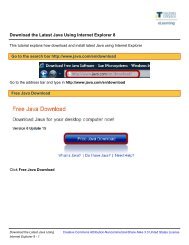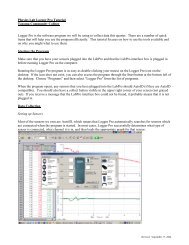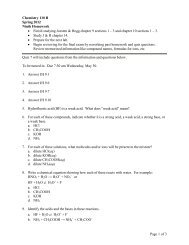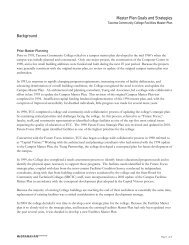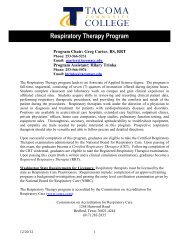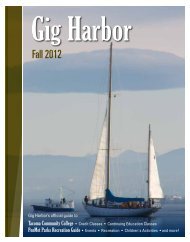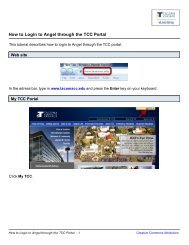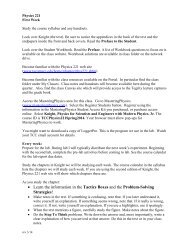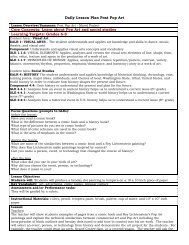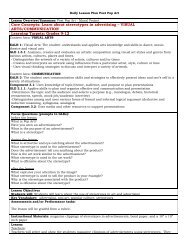2005-07 Catalog - Tacoma Community College
2005-07 Catalog - Tacoma Community College
2005-07 Catalog - Tacoma Community College
- No tags were found...
You also want an ePaper? Increase the reach of your titles
YUMPU automatically turns print PDFs into web optimized ePapers that Google loves.
<strong>2005</strong>-20<strong>07</strong> <strong>Catalog</strong>Credit Course Descriptions 85ACCNT 175 (W)Accounting with QuickBooks (5)(formerly ACCNT 241) Introduction toautomated accounting methods usingQuickBooks. QuickBooks is used to examinethe complete accounting cycle. Includesanalysis, demonstration, exporting, importingand hands-on experience using the generalledger, accounts payable, accounts receivableand payroll modules. This is the same classas CU 175. Students may take CU 175 orACCNT 175, but not both.Prerequisites: ACCNT 165 or CU 165 with agrade of ‘C’ or higher.ACCNT 210 (F, W, Sp, Su)Accounting Principles - Financial I (5)Emphasis is on the development andinterpretation of financial statements: thebalance sheet, income statement and thestatement of owner’s equity.ACCNT 220 (F, W, Sp)Accounting Principles - Financial II (5)Continuation of ACCNT 210. Introducesaccounting for long-term debt andinvestments. Examines the measuring andreporting of Stockholders’ Equity,consolidated statements and the preparationof the Statement of Cash Flows.Introduction to methods used to interpretfinancial statements.Prerequisite: ACCNT 210 with a ‘C’ or higher.ACCNT 230 (F, W, Sp, Su)Accounting Principles: Managerial (5)Introduction to cost concepts such as costvolume-profitanalysis and the budgetingprocess. Examines methods to determineproduct costs of a manufacturing businessand the methods employed to control costs,such as the use of the standard cost system.Prerequisite: ACCNT 210 with a ‘C’ or higher.ACCNT 250 (W)Federal Income Tax (5)Federal income tax for the layman,accounting student, working accountant/bookkeeper and small business owner, withspecial emphasis on tax issues affectingindividuals.ACCNT 290 (F, W, Sp)Work Internship (5)During one quarter of the sophomore year,students may receive college credits forhands-on accounting work experience andtraining in a private or public sectororganization.Prerequisite: Program Chair permission.ACCNT 299Independent Study (1-5)Study on an individual basis.Prerequisite: Program chair permission.Administration ofLaw and JusticeADJ 100 (F, W, Sp, Su)Introduction to Administration of Justice (5)History and evolution of the policeprofession; ethics and professionalization;the correlation between the police, thecourts and corrections in the criminal justicesystem; court organization procedures andfunctions; survey of professional careeropportunities and qualifications required;overview of current police practices.ADJ 101 (F, W, Sp, Su)Criminal Law (5)Introduction to statutory law covering crimesagainst persons and property. WashingtonState law is emphasized regarding history oflaws, common, and statutory law. Laws ofarrest, act and intent, parties to crime,divisions of crime, principles and accessories,and penalties are covered. Course specificscenarios will be analyzed.Prerequisite: Assessment at college-level English andreading.ADJ 102 (F, Sp)Criminal Procedure and Evidence (5)Discover kinds and rules of evidence,conclusions, opinions, and expert witnesstestimony. Discussion of Exclusionary Ruleas it pertains to rules of search and seizure,criminal procedure, due process andconstitutional guarantees. Specific scenarioswill be analyzed to ensure understanding ofprocedural due process as well as judicial dueprocess.Prerequisite: Assessment at college-level English andreading.ADJ 103 (W)<strong>Community</strong> Policing (5)This course presents various problem-solvingmodels that seek to improve police efficiency,lower crime, and raise the perception ofsafety within a community and to improve thecitizen-police relationship. The course willprimarily focus on the Scanning, Analysis,Response & Assessment (SARA) model ofproblem solving and integrated communityorientedpolicing.Prerequisite: Assessment at college-level English andreading.Administration of Law and JusticeADJ 104 (F)Power, Multiculturalism, and the Law (5)This course examines personal biases andprejudices and explores the richness of thediverse communities in Western Washington.Consequences of discrimination when poweris focused through the lens of prejudice arediscussed. Issues are examined both fromthe law enforcement and communityperspectives.Prerequisite: Assessment at college-level English andreading.ADJ 105Ethical Issues in Law Enforcement (5)A seminar type course where intensivescenario-based workshops examine some ofthe most important ethical issues facing lawenforcement. Topics within the policesubculture and the dynamics of informalpower are discussed.ADJ 1<strong>07</strong> (F)Juvenile Justice System (5)In-depth examination of the magnitude ofthe juvenile delinquency problem, reviews oftheories and philosophies that guide anddirect our enforcement agencies, juvenilecourts, juvenile corrections and treatmentprograms.Prerequisite: Assessment at college-level English andreading.ADJ 140Introduction to Corrections (5)An overview of corrections in the UnitedStates with special emphasis on: prisons,jails, case law, changing philosophy ofpunishment and future developments inpenology. A field trip will highlight thecourse.Prerequisite: Assessment at college-level English andreading.ADJ 179Special Topics (2)Various short courses, seminars, or specialtopics will be covered. Topics will be offeredbased on need and interest to students. Areascovered may include investigations, crimeanalysis, legal trends, cultural diversity issues,criminal case analysis, or correctionalprogram evaluation. Credit awarded iscontingent upon the length of the course.Students may only apply two sections ofthese courses toward a degree.Prerequisite: Assessment at college-level English andreading.



